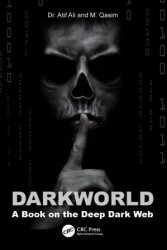Dark World: A Book on the Deep Dark Web
- Добавил: literator
- Дата: 4-10-2023, 14:28
- Комментариев: 0
 Название: Dark World: A Book on the Deep Dark Web
Название: Dark World: A Book on the Deep Dark WebАвтор: Atif Ali, Muhammad Qasim
Издательство: CRC Press
Год: 2024
Страниц: 303
Язык: английский
Формат: pdf (true)
Размер: 57.6 MB
Discover the hidden depths of the digital underworld in this comprehensive, interdisciplinary exploration of the dark web.
Ideal for security agencies, professionals, counter-terrorism experts, and policymakers alike, this work offers invaluable insights that will enhance understanding and fortify strategies. By shedding particular light on the nuances of the ‘dark market,’ this book provides readers with a detailed understanding of the dark web, encompassing both its sinister underbelly and unexpected potential.
This book also uncovers the latest trends and cutting-edge mitigation techniques. From illicit transactions to thriving business ventures, it examines the key domains and sectors that thrive within this clandestine environment. This book consolidates myriad perspectives on security and threats on the dark web.
Internet and World Wide Web (WWW) are far more extensive than we see when we’re just browsing in the digital environment. New information technology (IT) applications are causing the internet and its users to increase, which is expected to continue. Although the internet has overgrown, its vulnerability to misuse and abuse has increased, creating a severe risk and a problem in cyberspace that affects everyone. Every day, many cybercriminals attempt to illegally access unauthorized data on the web. Apple Safari, Mozilla Firefox, Microsoft Internet Explorer, and Google Chrome are most popular web browsers among internet users. When using a standard web browser, you access what is known as the surface web. However, much of the content on the deep websites is hidden. Recent studies show that most major search engines crawl a small portion of the web. According to the literature, many website contents are concealed on a deep website. There is a sector of the deep web referred to as the dark web (DW) where most cybercriminals conduct their illegal activities, also called the darknet.
Everything that isn’t indexable on the Surface Web is included in the Deep Web. There is no index for the Deep Web because it is either hard to crawl or not currently crawled at all. It’s also a lot bigger now. The internet isn’t just the World Wide Web (WWW, Surface Web); it’s the network infrastructure used to access the Surface Web. As a result, the Deep Web (or at least the majority of it; we will get to that in a minute) exists on the internet. The Deep Web includes any website or system that necessitates the entry of login credentials. Additionally, the Deep Web includes intranets of businesses, academic institutions, government departments, and other organizations and websites that prevent search engines like Google Scholar and Amazon from indexing certain parts of the site.
Like how the WWW exists on the internet, the Dark Web does as well (or rather, multiple darknets). Note that the Dark Web and Dark Net are not interchangeable terms. Consider the Dark Net as a sub-structure of the Dark Web, with restricted content and websites that can only be accessed through the previously mentioned software. I’ll use Tor, or The Onion Router, as an example of the Dark Net. Because it’s decentralized, users’ traffic is bouncing between different routers all over the place.
Audience:
This book’s objective is to present an interdisciplinary and easily understandable book on the Dark Web. This research will benefit security agencies, security professionals, counter-terrorism experts, and policymakers. The proposed work could be incorporated as a textbook or reference in my graduation degree on terrorism, policy-making, criminology, and data security.
The proposed monograph’s target audience includes the people listed below:
• IT Academic Audience: Choose juniors and seniors from universities interested in computer science or related IT fields like information systems, computer science, digital forensics analysis, information security, information systems, or information science educators.
• Government Audience: Managers, analysts, and public policymakers from all levels of government are interested in knowing more about the Dark Web and its impact on society and its security.
• Security Industry Audience: Think tanks and research institutes in the security and defense industries, as well as analysts and researchers, conduct IT-related security research and development, notably employing open-source web materials.
• Security Academic Audience: The general public, as well as academics, researchers, and graduate students interested in learning about the Dark Web’s impact on society, including political science, terror studies, and criminology.
Скачать Dark World: A Book on the Deep Dark Web
[related-news] [/related-news]
Внимание
Уважаемый посетитель, Вы зашли на сайт как незарегистрированный пользователь.
Мы рекомендуем Вам зарегистрироваться либо войти на сайт под своим именем.
Уважаемый посетитель, Вы зашли на сайт как незарегистрированный пользователь.
Мы рекомендуем Вам зарегистрироваться либо войти на сайт под своим именем.
